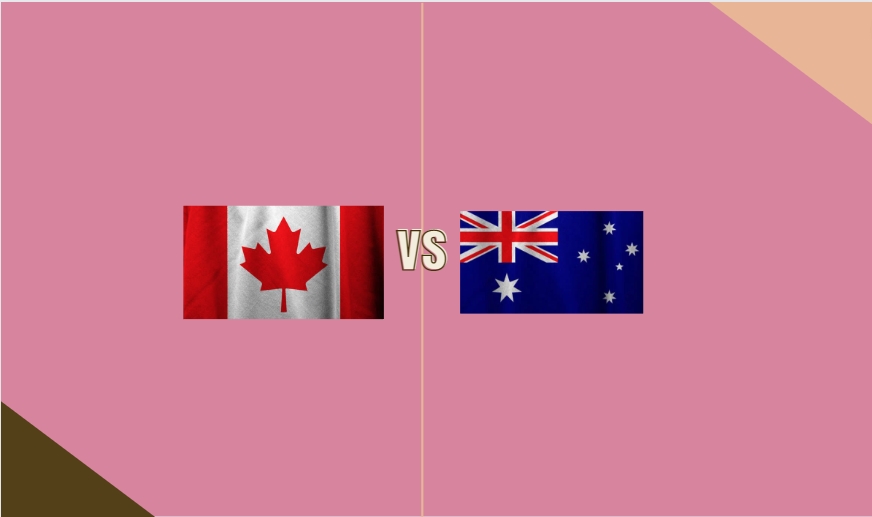Table of Contents
ToggleStudying abroad is an exciting and life-changing experience for many students. Choosing the right study destination is crucial as it can have a significant impact on the quality of education, career prospects, and overall experience. When it comes to studying overseas, Canada and Australia are two popular choices among international students. In this article, we will compare and contrast “Study in Canada vs Study in Australia.” We will explore the unique features of each destination and provide insights into the benefits of studying in these countries. Whether you are a high school student planning to pursue undergraduate studies or a graduate student looking to further your education, this article will help you make an informed decision about your study destination.
Overview Of Studying In Canada
Education System and Degrees in Canada
The education system in Canada is highly regarded and is recognised globally for its academic excellence. Canadian universities offer a wide range of degree programmes, including undergraduate, graduate, and doctoral degrees. The academic year in Canada typically runs from September to May, with a break in December for the winter holidays.
Top Universities in Canada
Canada is home to several top-ranked universities, including the University of Toronto, the University of British Columbia, and McGill University. These universities are known for their academic excellence, research capabilities, and vibrant campus life. In addition to traditional universities, Canada also has a strong community college system that offers technical and vocational programmes.
Cost of Living and Tuition Fees in Canada
Compared to other popular study destinations, such as the United States and the United Kingdom, the cost of living and tuition fees in Canada are relatively affordable. International students should expect to pay between CAD 20,000 to CAD 40,000 per year for tuition fees, depending on the programme and university. Additionally, the cost of living in Canada is also reasonable, with students typically spending between CAD 15,000 to CAD 20,000 per year on accommodation, food, and other living expenses.
Scholarship and Funding Opportunities in Canada
There are several scholarship and funding opportunities available to international students studying in Canada, including government-funded scholarships, university-specific scholarships, and private scholarships. International students may also be eligible for part-time work opportunities on and off-campus, which can help offset the cost of living expenses.
Pros and Cons of Studying in Canada
Studying in Canada has several advantages, including access to world-class universities, affordable tuition fees, and a welcoming and diverse culture. Additionally, Canada offers excellent post-graduation job opportunities for international students, making it an attractive option for those seeking to build their careers. However, studying in Canada also has its challenges, including harsh winters, limited work opportunities outside of major cities, and a highly competitive job market in certain industries.
Summary Of Canada VS Australia
| Studying in Canada | Studying in Australia | |
| Education System and Degrees | Highly regarded education system | World-renowned education system |
| Offers undergraduate, graduate and doctoral degrees | Strong focus on practical learning and research | |
| Top Universities | University of Toronto, University of British Columbia, McGill University | University of Melbourne, University of Sydney, Australian National University |
| Cost of Living and Tuition Fees | Relatively affordable | Varies depending on location and lifestyle |
| International students pay CAD 20,000 to CAD 40,000 per year for tuition fees | International students pay AUD 20,000 to AUD 45,000 per year for tuition fees | |
| Cost of living: CAD 15,000 to CAD 20,000 per year | Cost of living: AUD 18,000 to AUD 25,000 per year | |
| Scholarship and Funding Opportunities | Government-funded, university-specific, and private scholarships | Government-funded, university-specific, and external scholarships offered by organizations and foundations |
| Pros and Cons of Studying | Advantages: access to world-class universities, affordable tuition fees, welcoming and diverse culture, excellent post-graduation job opportunities | Advantages: world-class education system, excellent research opportunities, welcoming and multicultural environment |
| Challenges: harsh winters, limited work opportunities outside major cities, highly competitive job market in certain industries | Challenges: distance from home, high cost of living |
Overview Of Studying In Australia
Education System and Degrees
Australia has a world-renowned education system, with a diverse range of programmes and degrees available to international students. The country has a strong focus on practical learning and research, and many Australian universities are ranked among the best in the world. The education system is divided into three levels: primary education, secondary education, and tertiary education. Tertiary education includes universities, vocational education, training institutions, and English language schools. Australian universities offer a wide range of degrees, including undergraduate, postgraduate, and research degrees, and are known for their high academic standards.
Top Universities in Australia
Australia is home to some of the world’s top universities, including the University of Melbourne, the University of Sydney, and the Australian National University. These universities are renowned for their quality of education, research opportunities, and excellent student support services. The country also has a strong vocational education and training sector, with institutions like TAFE providing practical and industry-focused training.
Cost of Living and Tuition Fees
The cost of living in Australia varies depending on the location and lifestyle. Major cities like Sydney and Melbourne can be expensive, but there are also more affordable options available. As an international student, you will also need to consider tuition fees, which can be higher than those for domestic students. However, Australian universities offer a range of scholarships and financial aid options to help ease the financial burden.
Scholarship and Funding Opportunities
Australia offers a range of scholarships and funding opportunities for international students. These include government-funded scholarships, university-specific scholarships, and external scholarships offered by organisations and foundations. It is important to research and apply for scholarships early as many have early application deadlines.
Pros and Cons of Studying in Australia
Studying in Australia has its pros and cons. On the one hand, the country offers a world-class education system, excellent research opportunities, and a welcoming and multicultural environment. However, some students may find the distance from home and the high cost of living to be too much to bear. However, many students find that the benefits of studying in Australia far outweigh the challenges.

Factors To Consider When Choosing Between Canada And Australia
When deciding on where to pursue higher education, one of the most common dilemmas students face is whether to study in Canada vs study in Australia. Both countries are popular study destinations for international students due to their excellent academic institutions, quality of life, and diverse cultures.
One of the most important factors to consider when deciding between study in Canada vs study in Australia is as follows:
- Cost of living
The cost of living can vary greatly between the two countries and can impact the overall affordability of studying there. - Tuition fees
Similarly, tuition fees can also vary greatly between the two countries, and it’s important to consider how much you can afford to pay for your education. - Job opportunities
After completing your studies, you may want to stay and work in the country where you studied, so it’s important to consider the job opportunities available in each country. - Quality of education
Both Canada and Australia have excellent academic institutions, but it’s important to research and compare the quality of education in your desired field of study. - Cultural fit
Another important factor to consider is how well you will fit into the country’s culture, including factors such as language, lifestyle, and social norms. - Visa requirements
Finally, it’s important to consider the visa requirements for studying in each country, including application procedures, fees, and eligibility requirements.
It is important to note that the decision is very subjective depending on the student’s field of study, requirements, facilities available and other personal factors.
How Do Academic And Professional Aspirations In Canada Compare To Those In Australia?
Both countries offer a range of academic programmes and research opportunities that can help you achieve your academic and career goals. However, the specific programmes and institutions you may be interested in may differ between the two countries.
| Key Features | Canada | Australia |
| Higher education | Highly regarded globally | Highly regarded globally |
| Degrees offered | More focus on research-based degrees | More focus on professional/industry degrees |
| Academic culture | More formal and structured | More informal and flexible |
| Career prospects | Strong job market in STEM and healthcare | Strong job market in mining and finance |
| Work culture | Emphasis on work-life balance and diversity | Emphasis on work-life balance and autonomy |
| Entrepreneurship | Strong support for startups and innovation | Strong support for startups and innovation |
What Factors Should You Weigh As You Compare The Cost Of Living In Canada And Australia?
| Finances/Budgeting | Canada | Australia |
| Tuition fees (per year) | CAD 20,000 to CAD 40,000 | AUD 20,000 to AUD 45,000 |
| Cost of living (per year) | CAD 15,000 to CAD 20,000 | AUD 18,000 to AUD 25,000 |
| Is It Comparatively More Expensive? | No | Yes |
Another crucial factor to consider when choosing between study in Canada vs study in Australia is your financial situation and budget. Studying abroad can be expensive, and the cost of living and tuition fees can vary significantly between the two countries. It is important to consider your financial situation and the availability of scholarships, grants, and other funding opportunities to help offset the costs of studying abroad.
How do Canada’s immigration policies and visa requirements compare to those of Australia?
These are also important factors to consider when deciding between study in Canada vs study in Australia. Both countries have different visa requirements and immigration policies that may impact your ability to study and work while in the country. It is important to research and understand the visa requirements and immigration policies of both countries to ensure that you can successfully obtain the necessary documents to study and work in your chosen destination.
| Visa Requirement | Canada | Australia |
| Student Visa | Study Permit required for studies over 6 months | Student Visa (subclass 500) required for studies over 3 months |
| Work While Studying | Part-time work allowed up to 20 hours/week during academic sessions | Part-time work allowed up to 40 hours/fortnight during academic sessions |
| Post-Graduate Work Permit | Available for up to 3 years after graduation | Available for up to 4 years after graduation |
How convenient is it to travel to Canada compared to Australia?
These are other important factors to consider when choosing between study in Canada vs study in Australia. Both countries offer unique cultural experiences and attractions, but the location and accessibility of each destination may differ. It is important to consider the proximity of the university to public transportation, cultural amenities, and other important facilities.
Which language proficiency levels are preferred in Canada and Australia and why?
Lastly, language requirements and proficiency are essential factors to consider when deciding between study in Canada vs study in Australia. While both countries are predominantly English-speaking, there may be differences in language requirements for admission and proficiency levels required for academic success. It is important to assess your language skills and research language requirements for universities in Canada and Australia to determine which destination may be a better fit for you.
| Language Proficiency | Canada | Australia |
| English | IELTS: Overall 6.5, with no band less than 6.0; or TOEFL: 90 overall, with minimum scores of 20 in each section | IELTS: Overall 6.5, with no band less than 6.0; or TOEFL: 79-93 overall, with minimum scores of 21 in Writing and 18 in Speaking |
| French | A good knowledge of French may be required for some programs and universities | Not required, but may be preferred for some programs and universities |

Conclusion
Both Canada and Australia offer high-quality education, excellent student support services, and a welcoming environment for international students. However, there are some factors to consider when choosing to study in Canada vs study in Australia, such as cost, location, and cultural differences.
If you are considering studying abroad and are torn between Canada and Australia, we recommend that you do your research and weigh the pros and cons of each option carefully. Think about your personal preferences, academic goals, and long-term career aspirations, and choose the option that best aligns with your needs.
We hope this article has been informative and helpful in your decision-making process. If you have any questions or comments regarding studying in Canada versus studying in Australia, please share them with us in the comments below. We would love to hear your thoughts and experiences on this topic.
FAQs
What is the cost of studying in Canada versus studying in Australia?
The cost of studying in Canada or Australia varies depending on the university and programme. Generally, tuition fees in Canada are slightly lower than in Australia, but the cost of living in Canada can be higher.
Which country offers better job opportunities for international students?
Both Canada and Australia have strong job markets and offer opportunities for international students to work part-time during their studies and after graduation. However, Canada has a more lenient immigration policy that makes it easier for international students to obtain permanent residency and work in the country after graduation.
What is the quality of education like in Canada versus Australia?
Both Canada and Australia have world-renowned universities and offer high-quality education. However, the teaching and learning styles may differ slightly between the two countries, and students should research their desired programme and university to ensure that it aligns with their academic goals and learning style.
What is the student culture like in Canada versus Australia?
Canada and Australia both have welcoming and inclusive student communities, but there may be some cultural differences to consider. For example, Canada is known for its multiculturalism and may offer more opportunities for international students to connect with diverse communities. In contrast, Australia has a more laid-back and outdoor-oriented culture, with many opportunities for outdoor recreation and adventure.
What are the visa requirements for studying in Canada versus studying in Australia?
International students must obtain a study permit or visa to study in Canada or Australia. The visa application process may differ slightly between the two countries, and students should research the specific requirements and timelines for their desired programme and university. Generally, both countries require proof of enrollment, financial support, and a valid passport.
PS: If there’s anything more, you’d like us to know about. Add it to the comments section!
Thank you for reading this blog post on ‘Study In Canada Vs. Study In Australia: Which Fits?’ We hope that it has provided valuable information for prospective students considering this university. Check out our other blogs of interest:

















1 thought on “Top PGDM Courses In Canada: Universities & Eligibility”
I have done Bachelor’s in Culinary Arts from India and completed my graduation in the year 2022 .I am 22 years old. After graduation, I have done 1 year paid internship from USA .Now, I would like to take occupational experience and learn culinary skills and also do masters in Culinary arts.How can I find the college n best course / country where I can persue studying further